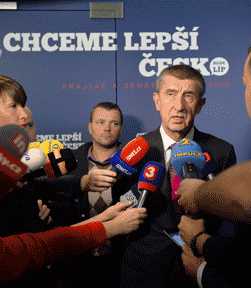Czech Republic: politics in the hands of businessmen

The dispute inside the Czech government coalition has escalated nine months ahead of the parliamentary election. The two groupings dominating the political scene, the Czech Social Democratic Party (ČSSD) and the political movement ANO 2011 led by deputy prime minister, minister of finance and businessman Andrej Babiš, are at one and the same time coalition partners and each other’s main political opponents. Over the past few months the dispute focused on the amendment of the conflict of interest act. Introducing stricter regulations, something the Social Democrats and the political right have been attempting to push through, is aimed above all at the leader of ANO, and work on these regulations has been used by Babiš’s opponents to engage in a public discussion on the risks an oligarchisation of the Czech politics entails. The Czech media has branded it ‘lex Babiš’.
The leader of ANO’s fortune is worth around US$2.7 billion and he owns, for example, the agricultural-food-chemical-media corporation Agrofert. He has criticised this act as unconstitutional but has nevertheless stated that he will follow its regulations. According to the new regulations, acting in compliance with the law, he will be able to maintain the existing model of functioning in politics and business. His assets will most likely be transferred to a trust fund managed by people close to him. Thus, paradoxically, Babiš may benefit from the new conflict of interest regulations, because they have placed him in the position of a victim of the political establishment, helping ANO to attract the protest vote. Furthermore, in the longer term, the new regulations will make it harder for Babiš’s critics to point to the conflict of interest inherent in his political career.
Coalition partners – competitors
The centre-left cabinet formed by ČSSD led by Prime Minister Bohuslav Sobotka, ANO 2011 and the Christian and Democratic Union – Czechoslovak People’s Party (KDU-ČSL), has for a few months now been functioning in campaign mode ahead of the parliamentary election scheduled for October this year. The main political dispute in the Czech Republic is taking place inside the government coalition between the Social Democrats and ANO. Their leaders, Sobotka and Babiš, are attacking one another in the media with increasing strength. At the same time, parliament is intensively putting into effect the key demands of the coalition parties. On the one hand, it has been implementing the political manifesto of ČSSD, for example, by increasing the minimum wage and public sector pay. On the other hand, it has implemented ANO’s proposals, for example, introducing new mechanisms streamlining tax collection.
The flagship project of the Ministry of Finance led by Babiš – the electronic records of sales (known as EET in the Czech Republic) – was launched at the beginning of December. This is a system which transfers real time information on sales to the fiscal administration (the first phase covers catering and hotel services – around 40,000 entities). The project has been evaluated rather sceptically by entrepreneurs, while the public has a rather positive approach to it. The real impact of this system on VAT collection will be possible to assess in a few months at the earliest. Nevertheless, the leader of ANO is already boasting of increased tax revenues (7.5% as compared to January – November 2015).
The Christian Democratic party KDU-ČSL, the smallest partner in the government coalition, has been at pains to take care of its regular electorate (conservative residents of Moravia and small farmers), for example, by insisting on the allocation of more funds to pro-family policies and investments in rural regions. In parallel to this, the Christian Democrats have been trying to gradually expand the circle of their supporters by attracting the right-wing electorate in larger cities. For example, the meeting of the Christian Democrat ministers with the Dalai Lama in 2016, which was criticised by the prime minister, was expected to serve this purpose.
ČSSD and ANO lead the polls mainly because the government discontinued the austerity policy that had been pushed for by the centre-right cabinet (2010–2013). The fact that the Czech economy is in a very good condition also helps Sobotka’s government. The Czech Republic has reached a record-low unemployment rate (5.5% in 2016) and a budget surplus (for the first time since 1995), and the Czech bonds have a negative interest rate (the state earns money issuing them). Given this context, the changes in taxes are becoming one of the key topics of the election campaign. ANO insists on reducing the 21% VAT rate and lifting the tax on dividends. In turn, the Social Democrats are opposed to this and want progressive rates to be introduced for income tax and corporate tax.
The permanent conflict of interest
Conflict of interest is inherent in Babiš’s political activity, and he makes no attempt to hide this. When the leader of ANO became a member of the cabinet, he resigned from his position in the management of Agrofert, but he still owns over 200 firms which employ more than 34,000 people in the Czech Republic, Slovakia and Germany (among other countries). At the same time, as the minister of finance he supervises the state’s shares in dozens of companies. Babiš’s firms have a dominant position in the Czech agricultural and food sector, starting from feed and fertiliser production to cereal, milk and meat production. He also owns some important chemical plants. Before Babiš became a member of the cabinet in 2013, he also began investing in the media. At present, he owns, for example, the popular dailies Mladá Fronta Dnes and Lidové Noviny (including their websites) and the most popular radio station in the Czech Republic, Impuls. Over the past few months, his firms have been investing in in vitro clinics.
The growing support for ANO in the polls (32% in December 2016 as compared to 20% for ČSSD, according to the CVVM) indicates that a significant section of the public does not mind the concentration of political and business power in Babiš’s hands. Babiš distances himself from ‘traditional politicians’ at every turn and is trusted by almost half of the Czech public (second position in the ranking after President Miloš Zeman), while Sobotka is only trusted by every third Czech (more than half of the respondents distrusts him). Such strong support for ANO and Babiš has three main causes. Firstly, it is an effect of the great disillusionment with the existing political elite, especially the right-wing parties which disgraced themselves during Petr Nečas’s government (2010–2013). Secondly, Babiš is viewed as an effective and responsible entrepreneur when compared to leading Czech businessmen – he pays taxes in the Czech Republic, reinvests profits and additionally supports culture and sports. Thirdly, ANO owes its success to a professional and unceasing election campaign. Babiš’s grouping has convinced the electorate about the successes of its ministers much more efficiently than ČSSD. It has intensively used online social networking media, skilfully capitalised on direct informal contact with citizens and employed the media owned by Babiš to attack their political opponents.
ANO, a grouping established by Babiš in 2011 as Action of Dissatisfied Citizens, has maintained its character of a top-down controlled anti-establishment protest movement that is not linked to any ideology. The only binding factors are Babiš and his sweeping statements, the key one being: “the state should be managed like a firm”. Babiš’s leadership is unquestioned in ANO, and the grouping remains disciplined.
The storm inside ČSSD
The Social Democrats’ position in the rivalry with ANO has clearly been weakened by disputes within the party. The fact that ANO has clearly led the polls and the Social Democrats’ failure in the local election last October (ANO garnered 21% and the ČSSD 15% of the votes on a country-wide scale) activated the opposition inside the party. The leaders of ČSSD are criticised for passiveness with regard to Babiš’s moves. Sobotka has been trying to soften these disputes inside the party keeping in mind the party congress in March, for example, by replacing ministers. Nevertheless, the ambitions of Sobotka’s critics inside his party remain a serious obstacle to keeping ČSSD’s pre-election message coherent. The dispute inside the party also has an ideological tone to it – the Czech Social Democrats are searching for an identity and remain strongly diversified – ranging from a conservative, anti-immigrant wing close to President Zeman to a wing modelled on the German SPD (ecology and supporting minorities).
The issue escalating the splits inside ČSSD is the choice of the party’s candidate for the presidential election in 2018. Miloš Zeman, the former leader of this party who is popular among their electorate, will most likely seek re-election. However, the president is in bitter conflict with the present leadership of ČSSD, and openly backs Sobotka’s opponents inside the party and deputy prime minister Babiš (for example, by vetoing the conflict of interest act). Zeman has no strong political base in parliament, so he is seeking support from various political circles. An alliance with the president is of little worth to the major forces in parliament. One proof of this is the failure of the Party of Civic Rights – Zeman’s people which, despite president’s strong engagement in the campaign preceding the parliamentary election in 2013 garnered only 1.5% of the votes.
How can Andrej Babiš be stopped?
The amendment of the conflict of interest act is a key project for ČSSD, one intended to consolidate the party and to clearly distance it from its coalition partner, ANO. It was sent to parliament in August 2015, and the new regulations were finally adopted on 11 January 2017, after parliament overrode the presidential veto. Pursuant to the amendment, firms in which a government member has at least a 25% stake will not be allowed to take part in public tenders. Such firms will not be given state support for investments and will have limited access to public subsidies. Furthermore, government members, as well as MPs and a number of other public officials, will not be allowed to have shares in the media (apart from Internet media) or to manage them. These regulations will come into force 15 days after publication.
However, the regulation concerning the media market does not cover public officials who already hold public office. This means that deputy prime minister Babiš does not have to relinquish ownership of his media assets ahead of the parliamentary election scheduled for autumn this year. The amendment also introduces a generally accessible online register of asset declarations from politicians and key officials, which is due to be launched in September 2017.
The amendment of the conflict of interest act, which was adopted owing to support from ANO’s coalition partners, ČSSD and KDU-ČSL, as well as most of the opposition, has been criticised by Babiš as an attempt to eliminate him from political life. However, it is quite unlikely that he will give up his political career or lose influence on his business interests as a consequence of the new regulations. Most likely, Agrofert and other firms owned by Babiš, will go to a trust fund that will be managed by one of his closest aides. According to the law, Babiš will be able to replace the person who manages the fund at any time and even to co-manage it himself, without violating the conflict of interest act.
Paradoxically, the amendment of the act may even help Babiš in his political career for a number of reasons. By transferring his assets, for example, to a trust fund, he will formally be no longer in conflict of interest. His opponents’ arguments that he is bypassing the law will then lose strength. However, at the same time, the assets transferred by Babiš to the trust fund will not have to be stated in the asset declarations, and thus his business interests will be less transparent. Babiš may also hope that the Constitutional Court will pass a verdict that will be beneficial to him. The president and deputies from ANO have announced they will contest the new regulations, but even some Social Democrat MPs do not conceal their doubts regarding the constitutionality of the amendment. However, the court is unlikely to pass its verdict before the parliamentary election in the autumn.
Although the new regulations allow Andrej Babiš to find a way to maintain his present position in politics and business, the present version of the amendment of the conflict of interest act is optimal to his coalition partners, ČSSD and KDU-ČSL. If regulations that would really force the leader of ANO to choose between business and politics were adopted, this would mean breaking the coalition and the fall of Sobotka’s cabinet. In turn, the very fact of pushing through the new regulations concerning conflict of interest has allowed Babiš’s critics to launch a campaign in the media aimed at distancing themselves from their coalition partner and consolidating the left-wing electorate against him.
On the other hand, the amendments of the acts concerning the financing of political parties adopted last year have had a greater impact on the shape of the Czech political scene and on links between politics and business than the amendment of the conflict of interest act. The new regulations which came into effect at the beginning of this year, for example, impose an obligation to keep transparent bank accounts on political parties and movements. At the same time, the statutory limit of an annual donation from a natural person and a corporate entity was set for the first time at around 111,000 euros. The imposition of limits on the expenses on an election campaign (for example, around 3.3 million euros for a political party or movement in the election to the Chamber of Deputies) is another change that offers the chance to create equal opportunities for individual groupings in the election process. The way in which the election campaign pans out will show how effective these regulations are. Nevertheless, they are an important step to improving the transparency of the links between politics and business. The regulations also create an opportunity to reduce the advantage Andrej Babiš has over his competitors due to his wealth.
Jakub Groszkowski
Appendix
Andrej Babiš is not the only one
The non-transparent links between business and politics had become a real challenge in the Czech Republic long before Andrej Babiš entered politics. The conditions for such links were created by the coupon privatisation which contributed to the consolidation of a significant part of state capital in the hands of a small group of businessmen. This was coupled with rather vague regulations concerning the financing of political parties. As a result, open and covert networks of connections between politicians and the richest Czechs were created. For example, the then coal potentate Zdeněk Bakala for years financed the Czech political right and was a business partner (including in the media) of the former Minister of Foreign Affairs, Karel Schwarzenberg. Jaromír Soukup, currently co-owner of a media and advertisement corporation, first supported ČSSD and then the Green Party (he served as the Deputy Minister of Education as a representative of this party). In 2010–2012, the Czech government was co-formed by Public Affairs, a party which was a political and business project of businessmen from Prague, which was also backed by Bakala and Soukup. Before Babiš became engaged in politics, he did not conceal his good relations with politicians, above all those on the left wing of the political scene. The ownership changes on the Czech press market also contribute to close contacts between politicians and businessmen. Over the past few years, almost all foreign owners have withdrawn from this sector and have been replaced by the richest Czech and Slovak businessmen. The media industry generates low profits and there is much to indicate that to a great extent they treat it as a tool for building a positive image of their firms and influencing politicians.




